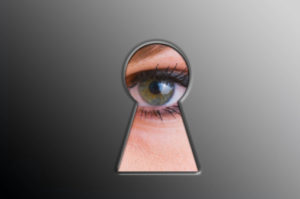Relationship Advice Tips from Dr. Jeanette Raymond, Ph.D.
One of the most common reasons for couples entering therapy is because one or other partner has been caught in a lie that has broken the bonds of trust and intimacy. The sense of betrayal is so huge that the foundations of the relationship crack and are often hard to mend. It doesn’t have to be about some unacceptable behavior like watching internet porn, gambling, drinking or using substances. Those tangible things are easier to deal with compared to the less obvious lies that relate to the feelings your partner has about you or the relationship. Just think how unsettling and anxiety provoking it can be when your partner says they love you but you sense they are lying? It’s the start of a deepening sense of insecurity that leads to suspicion and fear, which is what led Andrew and Sharon to positions of self-defense and protection rather than mutual sharing and care taking.
As he turned around to face the wall, thirty-nine year old Andrew, a locksmith, dismissed the words “I love you” that his thirty-seven year old book illustrator partner uttered as they got ready to sleep. He felt the words as placatory and routine- without meaning or sincerity. She never showed any signs of loving him, which he longed for. To twice divorced Andrew, she was lying again. He gritted his teeth in anger, tensed up his body and withdrew into his shell.
Two days later Andrew was really late home after dealing with an emergency lock out some distance away. He had stopped off to see an old friend on the way back and one drink led to another, until he realized how late he was. When he got home he told frantic and angry Sharon that his van had broken down and he had to wait for help. He lied and Sharon knew it. That made her angrier than ever, leading to a big argument about Andrew’s lying and expecting to get away with it. The sparks of Sharon’s anger lit a fuse under Andrew who accused Sharon of lying about loving him, and about making the whole relationship a sham.
If she lied about her feelings for him, then why shouldn’t he lie about having a beer or two with his friends? Which was the bigger lie? Which was more hurtful? Which was more harmful and serious in the long run? There was no exit point out of these mazes they went around over and over again.
Lying in relationships is all about who is entitled to protection
Both parties lied because they said things that were not objectively true. Yet both felt justified and basically honest. There was no malicious intent or unconscious need to hurt or punish. Both were in the ongoing business of protection – protecting their partner from feeling bad, protecting themselves from feeling guilt and shame, and protecting the relationship from blowing up at the time of the lie. At least that is what the intention is.
Andrew’s lie was in an effort to protect Sharon from feeling that she was not as good company than his friends. The deception was committed to save her from feeling bad. It also protected Andrew from having to face his guilt about choosing to have fun with friends rather than go straight home to Sharon.
Sharon’s words to Andrew about loving him felt like a lie to Andrew because he did not see evidence of it. From Sharon’s point of view it was not a deception but a statement of what couples are supposed to say to one another at certain times. It also came from guilt that she wasn’t showing it, and therefore it had to be said as compensation.
Is it okay to lie, and if so when and for reason?
Guilt forced Sharon and Andrew to try and protect themselves and their partner from bad feelings. Unfortunately the bad feelings come anyway, because the partner being lied to doesn’t feel that protection. In fact they feel disregarded. They get angry because they sense that their partner is trying to protect themselves at the other partner’s expense and that’s what makes the lie so hard to tolerate.
The problem is that there are two people in the relationship and both need to protect themselves from shame and guilt. When Sharon protects herself Andrew is enraged by her lie. When Andrew protects himself from those same feelings, Sharon experiences it as a lie and betrayal. It all boils down to a sense of outrage on Andrew’s part that Sharon dare to put her own protection over his need to be shown love, and Sharon’s fury that Andrew dare put his need to protect himself over her need for him to take care of her need for security as to his whereabouts.
So being lied to in these everyday instances is a threat to one’s sense that your needs should always be paramount and that your partner must always sacrifice his or her needs for yours. That is not humanly possible and unrealistic.
Andrew and Sharon would do well to recognize that self-protection is an inbuilt survival mechanism and that being part of a relationship doesn’t mean you yield the right and duty to ensure your psychological survival. Talking about the sense of insecurity that comes from feeling unloved can help Sharon understand what Andrew needs, but more importantly help her explore what stops her from showing it. Discussing her fear of not knowing where Andrew is and the possibility of losing him opens up a channel for taking care of that fear. Accusing each other of lying does nothing but break up the relationship.
So next time you feel you have been lied to, think about the intent of your partner towards you and what needs protection. You do the same things yourself so give your relationship a chance and get curious not furious.
Copyright, Jeanette Raymond, Ph.D.
You might also like:
Disclaimer: this article is for informational and educative purposes only. Dr. Raymond is not responsible for any reactions you may have when reading the content or using the suggestions therein. Interacting with this material does not constitute a therapeutic relationship with Dr. Jeanette Raymond, Ph.D.
[/fusion_builder_column][/fusion_builder_row][/fusion_builder_container]




